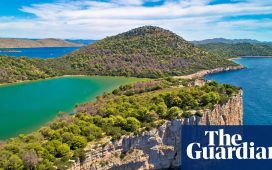A decade ago, my father, Terry Lee, found a wooden sign behind our cottage’s boathouse. He guessed it had once hung above the door, naming this Ontario lakeside property: Brynmorwydd. Dad, who grew up in Cardiff and emigrated to Canada in the 1970s, knew right away it was Welsh. But the cottage, which originally belonged to my stepmother’s family, was actually an exercise in Canadianness for my dad, who isn’t exactly handy with canoes or campfires. I don’t suppose he ever anticipated that it would draw him back to Wales, but some weeks later he spotted the name of the cottage’s first owner stamped on one of its beams: John G Bolt.
He searched deeds, records, maps and censuses with the help of my uncle, and the story emerged of John Bolt, born in 1886 near Llanrhaeadr, north Wales. The son of a gamekeeper, he moved away to Cheshire at the age of eight, after his parents died. In 1927, Bolt sailed to Canada and worked on the Canadian Pacific Railway: he claimed a plot of land, built a cottage, and named it after the estate where he’d been born: Brynmorwydd.
Dad and I arrived in Llanrhaeadr-yng-Nghinmeirch in summer 2013. Fog spread over the valleys, obscuring the sheep. It had been a decade since we’d holidayed together. While dad was renovating the cottage, I’d been living in England. But this trip was designed to bring us together: he wanted to track down the original Brynmorwydd; I was doing a PhD in landscape history. We felt like an ideal team.
Each day, we ventured out in search of clues: the estate no longer existed, and while some placenames remained, few buildings did. We had an 1875 OS map, which I compared with Google Maps, searching for the spot where Bolt was born.

We stopped in the pub and chatted to the barman. “A bit of an odd request,” dad began, his Welsh lilt swimming into the corners of his now-Canadian accent. “We’ve come from Canada, where we own a cottage by the name of Brynmorwydd …” “You’ll want to talk to the gentleman in the corner,” said the barman, pointing to an elderly man eating Sunday dinner. “He grew up in the estate’s main house.”
It seemed too coincidental. The man told us the land was up a narrow lane. And private. Undeterred, we drove up the winding lane to the crest of a hill. There was hardly anything there. An abandoned building, a gate, a No Trespassing sign and a wide valley view: a green quilt with hedgerow seams. Was this what John Bolt longed for? Dad pulled out a photograph of the wooden sign and posed for a picture.
We open our cottage each year when the ice on our bay has melted. Among the teapots and old photographs, a folder entitled “John G Bolt” holds the papers we carried as we combed the countryside. On every visit, I open it to check the pages are in order, then look for my father. He may be fumbling to split logs or tidying the boathouse. Once in a while he’ll rest, looking over the water that stretches before our Brynmorwydd.
Jessica J Lee is an author and environmental historian. Her latest book Two Trees Make a Forest is out now (Virago)














